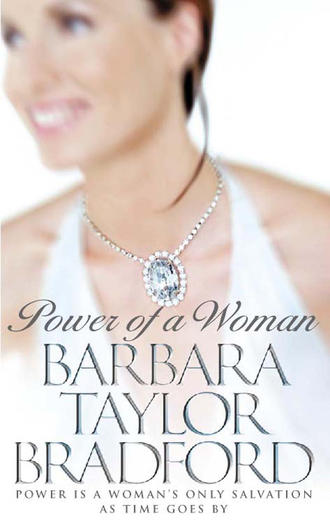
Полная версия
Power of a Woman
Even in the eight years they had lived in New York, Chloe’s life had been somewhat cloistered. She’ll never make it on her own, Stevie thought. She’ll be overwhelmed. She’s too sensitive, too delicate, and just far too young to be away from home, away from me. I’m going to say no. I must. I’m not going to let her go to England. She can go a year from now only if she is enrolled at Oxford.
It seemed to Stevie at that precise moment that a load had been lifted from her shoulders. Just making the decision was a blessed relief. The tight pain in her chest, which had been like a steel band since four o’clock that morning, was beginning to ease at last.
4
NO MATTER HOW BUSY SHE WAS, STEVIE ALWAYS found time at some point each day to write in her daily journal. And so that morning, while she waited for her mother, Derek, and Miles to arrive, she opened her current diary and wrote: Thanksgiving Day 1996: Connecticut, then sat staring at the page, lost in her thoughts.
She had kept a journal for years, most of her life, and there were volumes of them locked away in a cupboard at the other side of the upstairs study, where she now sat at the desk.
Thirty-four years had been recorded in them since her mother had presented her with her first diary when she was twelve. That had been in 1962. It seemed very far away now; so much had happened to her in the intervening years. She had lived a lifetime and then some, or so it seemed to her.
Her first diary had had its own little lock and key and it had withstood the test of time very well; she had looked at it recently and been amazed that it had weathered the years so well. The paper was a bit yellowed at the edges, the ink faded on some pages, but that was the only damage, if you could even call it that.
On the whole, a miracle of preservation, Stevie thought, and put down her pen, sat back in the chair, her thoughts turning to her mother, who had also kept a diary most of her life. They had always been close, had had a symbiotic relationship when she was a child. Her father, Jerome Anderson, had not been the right husband for Blair, nor had he been a very good father, and this had brought her and her mother even closer together.
Newspaperman, ladies’ man, bon vivant, and man-about-town, Jerry had not been cut out for family life, and that was exactly what her mother had craved. Beautiful, glamorous, international supermodel Blair Connors had wanted only to be a wife and mother. She was the success she was because of her face and figure, the way she dominated the catwalk and made love to the camera. It was certainly not because of drive or ambition. Even at the height of her career she had wanted to stay at home and cook, raise children, be a housewife, a mother, and a good wife to the right man. Domesticity was her idea of bliss.
Derek Rayner, English classical actor par excellence, handsome matinee idol and movie star, had seemed such an unlikely candidate for the role Blair had cast him in all those years ago. The wrong man, as far as Blair’s friends were concerned.
But as it happened, he had been the right man, the perfect choice, the perfect mate. Blair and Derek had been married for over thirty years and still adored each other. Their only disappointment was that they had not had any children of their own. Perhaps that was one of the reasons they were inseparable, and Derek never went anywhere without his beautiful and accomplished wife.
Stevie was relieved they were coming to spend Thanksgiving with her. On the phone yesterday her mother had sounded worn out, which was unusual for her. She had mentioned that Derek was exhausted after twelve weeks on location making a movie in Arizona, then looping at the studio in Los Angeles. The film assignment had come right on top of his long run in the Broadway revival of Becket. According to her mother, it was now essential that he get a good rest.
“No more work for a while,” Blair had said. “He’s really looking forward to the long weekend with you, Stevie, before we fly back to London next week,” her mother had added, and Stevie was determined to make it a wonderful few days. She wanted her mother and Derek to have the great luxury of peace and quiet in comfortable surroundings, with lots of good food and rest. And certainly no pressure.
She thought suddenly of Chloe. She would have to have a talk with her later, warn her not to take all of her little problems to Derek. She had a tendency to pester him at times. Stevie supposed that was understandable, in that Derek was the closest thing to a father Chloe had ever had.
Certainly Bruce Jardine had been more like a grandfather. He was much older than Derek, less active, and decidedly crotchety a good part of the time. No wonder Miles and Chloe called him Old Bruce. He was such an old man in many ways; he had not aged well at all.
Stevie was aware that Chloe loved him, despite her protestations to the contrary and desire to cast him in the role of ogre or tyrant. As for Bruce, there was no doubt in Stevie’s mind that Bruce Jardine loved the girl in return. He had shown her daughter too much favor, displayed too much kindness to her for it to be otherwise. Whilst this baffled Stevie occasionally, it nonetheless pleased her. Bruce had treated Chloe as a Jardine all of her young life, and Stevie would always be grateful to him for that.
Bruce was not an easy man to care about or even like, but she had grown quite attached to him over the years. They had worked well together in a very temperate climate for twenty years, and there had rarely been any display of temperament or outbursts of anger on his part. Most of the years had rolled by on a very even keel, it seemed to her now.
It struck Stevie that it might be a good idea to talk to Bruce about Nigel. She and Chloe were going to spend Christmas in London, and that would be the ideal time to unburden herself. Unburden myself, she thought in amazement. Do I really feel that strongly about Nigel’s attitude? She sighed, thinking that perhaps she did.
Not only did she love her eldest son, she admired him no end, and there was a lot to admire. He was a clever, indeed brilliant young man with a great deal of talent and a good head on his shoulders. But he had a flaw, and it was a flaw that was fatal. He believed he knew better than anyone else, was convinced of the rightness of his ideas and beliefs, and he never took no for an answer, would brook no argument. He was far too stubborn and opinionated for his own good. His attitude verged on arrogance. It dismayed her that he could not compromise, that he was so rigid.
He was just like his grandfather. No, he’s worse, she thought, and laughed a hollow little laugh. He was Bruce’s clone. As Bruce had been when he was a younger man. Perhaps more so.
It would be hard to speak critically to Bruce about his clone. This brought a smile to Stevie’s face. She wasn’t going to talk to Bruce about her son’s character, rather about her suspicion that he wanted to oust her from the company. If this were the case, Bruce would surely put a stop to his manipulations.
But then, she could do that herself. She could fire Nigel.
He was, after all, her employee.
He worked for her.
She was the managing director of Jardine’s of London and president of Jardine’s of New York, just as Bruce was chairman of the board. Nigel was a director of the company, as were his two brothers, and they would always be directors. That was their right, their inheritance.
But she could take Nigel’s job away from him at any time if she so wished. It was as easy as that, just like snapping her fingers together.
No, not so easy, she reminded herself. He’s my son, my firstborn; I wouldn’t want to hurt him, to humiliate him, or to destroy him. Besides, he’s good at his job. The very best.
I simply have to make him toe the line, curb his ambition for the moment. He has to bide his time until I retire.
Stevie laughed out loud. Easier said than done when she was on the other side of the Atlantic…thousands of miles away.
Her mind swung to Gideon. Now, there was a son who was not one bit ambitious, at least not when it came to possessing the company and amassing power. All he wanted was to create flawless diamonds from the rough…make beautiful things. Gideon did worry her on a personal level, and she had been worried about him for some time now. He had not looked well, had seemed distracted, fretful, and impatient when she had seen him at the London showroom in late September. She remembered how pale and gloomy he had looked. In her opinion, he hadn’t been himself since he had broken up with Margot Saunders. Had he cared for that young woman more than he’d let on? She would talk to Miles about his twin during the weekend.
Her face instantly changed, took on a warm glow, and her eyes brightened. Miles was her pride and joy; she admitted it freely…in the privacy of her thoughts.
And Miles would help to take Chloe in hand too; she could rely on him to do that. Chloe and Miles had always had an affinity for each other and he was good with his little sister. Unlike Gideon, who had considered her to be a bit of a nuisance. And now Chloe wanted to learn from her brother Gideon. Stevie shook her head. People were so very strange.
She had often thought how odd it was that although Miles and Gideon were identical twins and looked alike, when it came to their personalities and characters, they were as different as chalk and cheese.
Miles was so much lighter, more carefree, gentle, well balanced, and a genuine charmer. Conversely, his twin was introverted, stubborn—more like Nigel in that way—and a perfectionist who at times seemed ridiculously persnickety, almost old-maidish. And yet he could be generous to a fault, and he truly did have the soul of an artist. He loved anything and everything that was beautiful, be it a woman, a painting, a sculpture, a tree, a seascape, a garden, a priceless gemstone, or a piece of jewelry. And he had an extraordinary eye, refined and exquisite taste.
Picking up her pen, Stevie looked down at the page and realized she had put nothing on paper so far other than the day and where she was.
Slowly she began to write, and when she had filled two pages, she screwed on the top of her fountain pen, took the diary in her hands, leaned back in the chair, and read it.
Thanksgiving Day, 1996
Connecticut
When I think of my children and the things they do, it seems to me they are like strangers. Except for Miles. But then, he is the child of my heart, so like me in so many ways. Of course, I love them all, but he has always been special to me since he was small. I wonder, are all mothers like I am? Do they favor one child more than the others? I’m sure that it is so, but it’s hard to ask anyone that kind of…leading question. And do the children know? Do they detect it, sense it, feel it? Do they know there is one who is the real favorite of the mother?
Each of my children is different. Yet I can see traits in them that are mine. And some are Ralph’s. There are traits in them that come from Bruce. Fortunately, none of them have inherited anything of their grandmother, Alfreda, and for that I can honestly say I’m thankful. She was not a nice woman; she was cold, repressed, and bitter. She never had a kind word for me or anyone she considered to be her inferior. It is their other grandmother who shows up in them. My mother. Chloe has inherited her beauty, her willowy figure, her pleasing personality, and her desire to please; Miles has inherited her sense of humor and geniality.
I love them. I love all of my children. It’s the truth, I do. Maybe too much. And yet somewhere along the way I suppose I hurt them, damaged them without meaning to do so. But then we’re all damaged goods, aren’t we? Life damages us, people damage us, we even damage ourselves. I must have caused them pain and heartache. And hurt their feelings. We do that so often to those we love the most without even realizing it or meaning to. And perhaps I did neglect them at times when I was caught up with work and travel. But I never stopped loving them.
I think of them as my children. But, of course, they’re not children, not anymore. They’re adults. Grown-ups. People. Other people, not my children. They’re so different in so many ways. Strangers. Sometimes, anyway. Even Chloe is grown-up all of a sudden, knowing her own mind, hell-bent on getting her own way.
Soon I’m going to stop being a mother, stop thinking of myself as such. Instead I’ll be…? I’ll be…just there for them. If they need me. Is that possible? How do you stop being a mother? How do you stop worrying about them? Caring about them? Perhaps you don’t. How DO you stop being a mother? Can anyone tell me that?
Will I fare better with my grandchildren? I asked myself that question in the middle of the night, when I woke up with such suddenness. I will be a good grandmother to Natalie and Arnaud. Grandmothers are better than mothers, I’ve been told. Less possessive. My grandchildren are so precious and Nigel is lucky to have them, to have Tamara. She’s a good wife, a wonderful mother. A good young woman.
I think I’m beginning to resent the fact that Gideon teases her, calls her “the foreigner.” Her father is French, her mother Russian, and Gideon wants to make an issue about it. Why, I’ll never know. But it’s unkind. He says it’s in jest; yet I sense that’s how he really perceives her. I’d hate to think he was bigoted in some way. But I am very aware that my son Gideon thinks that anything not English is inferior. I wonder why he’s not learned otherwise yet? I did years ago.
Chloe. I can’t let her go to London. Chloe alone there at the age of eighteen! No, never. I feel it’s unwise. She’s too young. And she must go to university. She can’t just drop out.
Soon my family will be with me. Well, some of them, and that makes me happy. And each one of us has a lot to be thankful for this November of 1996. And I, in particular, am such a lucky woman. I have so much.
Stevie closed her diary, put it in the desk, and locked the drawer. As she pushed back her chair and rose, she heard the sound of the car on the gravel driveway outside.
Moving to the window, she pulled back the lace curtain and looked out. Her heart lifted when she saw Miles alighting.
He glanced up at the window, saw his mother, and waved.
She waved back, dropped the curtain, and hurried out, almost running down the stairs to the great hall.
5
MILES JARDINE COULDN’T HELP THINKING THAT AS he and his twin brother grew older, their mother appeared to be getting younger.
That morning she looked like a woman in her mid-thirties, and quite wonderful, as she came down the front steps to greet him and his grandparents. She was wearing a chalk-stripe gray-wool pants suit and a white silk shirt, and she was her usual elegant self.
It struck him that Gideon was correct when he said they were rapidly catching up with her, and that when they were forty-six she herself would still be forty-six, at least in her appearance anyway.
But then, she had been a mere nineteen-year-old when they were born, and she was blessed with youthful looks, thanks to her genes. His grandmother, who would soon be sixty-seven, didn’t look her age either, nor did she seem it. Blair was as youthful as anyone he knew, had great vitality, energy, and an enormous sense of fun.
“Hello, Ma,” Miles said as his mother drew to a standstill in front of him. “You look fabulous.” He smiled at her hugely, dropped the two bags he was carrying, and hugged her to him.
“I’m so glad you’re here, Miles darling,” she responded, smiling back. “And thanks for the compliment.” She drew away and went on down the steps. His eyes followed her as she embraced her mother and then Derek, who had been helping the driver unload the trunk of the car.
Suddenly Cappi and the two local young women who worked with her on weekends were greeting him. One of them grabbed his suitcases despite his protestations that he could manage perfectly well; she paid no attention, simply departed with the luggage.
Miles shrugged to himself and went on down the last few remaining steps, close on the heels of Cappi and her other helper.
But when he heard Chloe calling his name, he paused, swung around, and a second later his sister was hurtling into his arms.
“Hi, Pumpkin,” he exclaimed, and gave her a big bear hug.
“I’ve been waiting all morning for you, Miles; you’re late.”
He grinned at her. “I think I’m early actually, kid. We weren’t due until noon, and it was just eleven thirty as we turned into the gates. Anyway, how’re things at Romany Hall?”
“Okay,” she answered laconically. There was a slight pause, then she added softly, “But I want to—” She broke off abruptly, as if she had changed her mind.
“Come on, Pumpkin, what were you going to tell me?”
“Oh, nothing…it was nothing important, honestly.”
Miles thought otherwise, but he made no comment, as always discreet. “Come on, then, let’s help Cappi and Lola with all that stuff. When the Rayners travel, it’s like old-style royalty on the move. And God only knows what they bring with them.”
“The kitchen sink,” Chloe chortled. “That’s what Mom says anyway. She told me earlier that they’d arrive with two dozen suitcases plus the kitchen sink.”
“Not quite, but almost,” Miles agreed, laughing with his sister.
They went down to the driveway holding hands. Chloe glanced at him out of the corner of her eye. “So you didn’t bring Allison.”
Miles threw her an odd look. “Now, why would I bring her?”
“Bring who?” Derek asked as he braced himself for Chloe’s enthusiastic hugs and kisses.
Stevie stared at her son, waiting to hear his response to her stepfather’s question.
Glancing at Derek, Miles said, “Nobody. Nobody important, that is.”
Well, at least that’s to the point, Stevie thought. And leaves nothing to our imagination.
“Hello, darling,” Blair murmured, accepting Chloe’s kisses, which were, to her relief, more restrained than those just bestowed on Derek. “And who is Allison?” she asked, casting her glance on them all.
“Don’t look at me; I’ve no idea, my darling,” Derek intoned in his mellifluous actor’s voice and, hoisting two of the valises, went up the steps. Stevie and Blair followed, carrying some of the smaller bags.
After Miles had thanked the driver and tipped him, he too made his way to the front door with Chloe in tow. He said in a pointed voice, “Little pigs not only have big ears, but apparently loose tongues as well.”
Chloe giggled.
“Why did you mention Allison of all people, and in front of our mother? You know she’s longing for me to get married and have kids, so she can have more grandchildren. It was wrong of you, Chloe.”
“Well, you have been seeing a lot of Allison, and I thought it was…” Her voice trailed off lamely; she looked chagrined. And she felt suddenly uncomfortable under his fixed scrutiny.
“That’s my business, kid, not yours.”
“I thought it was getting serious between you two.”
“No. And even if I did have serious intentions, that has nothing to do with you or Mother or anyone else. It’s a private matter and it’s certainly not open for discussion within the family.”
“Oh.” There was a momentary pause, and she looked at him through worried eyes. “Are you mad at me?”
“No, but let’s not discuss my personal business in front of the rest of the family. Okay?”
“Yes, Miles, and I’m sorry.”
“That’s all right. Just remember what I said though. You’ve got to learn some discretion. You’re not a little kid anymore, you’re eighteen, and you must start growing up, behaving like an adult.”
Chloe nodded, her face suitably serious for once.
After coffee and hot buttered scones in front of the fire in the great hall, everybody dispersed in different directions. Stevie sent Cappi, Lola, and Chloe to help Blair and Derek unpack their voluminous luggage; Shana, the other young woman who worked with Cappi, took Miles’s bags up to his room. And his mother hurried off to the kitchen, explaining that she had to baste the turkey that was roasting in the oven.
Left alone, Miles wandered down the great hall into the dining room, and then slowly strolled through into the living room which adjoined it. He couldn’t help admiring the ambiance his mother had created in the house. It was immensely seductive, just as it was in her other homes. But he especially liked Romany Hall because it was an airy, spacious house filled with clear, crystalline light that poured in through the many windows upstairs and down, a great number of which were unencumbered by draperies.
Everything was sparkling and fresh throughout. The white paintwork was pristine; the windows shone; the wood floors gleamed, and there was not a speck of dust anywhere. No shabby corners, worn fabrics, or frayed rugs here. His mother was something of a perfectionist, and she maintained the house at the highest level. Every piece of furniture, each object and painting, was well cared for and in its proper place.
Although it was beautifully decorated, Romany Hall was not overdone and there was no unnecessary clutter or ostentation. The air was fragrant with potpourri, perfumed candles, and the unusual chocolate smell of the Sharry Baby orchids, their curvaceous stems laden with exotic dark blooms.
Miles did not linger very long in the living room, but continued on to the solarium, a room he generally gravitated to at least once every day when he was staying with his mother.
He had always been taken with its simple yet effective beauty—white walls, warm terra-cotta—tiled floor, and the eye-catching Pierre Frey fabrics patterned in reds, yellows, and blues that his mother had used on the sofas and chairs. The solarium had a French feeling to it, with its high-flung cathedral ceiling and beams, stone fireplace and the French Provençal furniture his mother had picked up at sales in the Loire Valley and the Maritime Alps.
The many windows and French doors made the solarium seem part of the outside, and the clarity of light was particularly noticeable here. Although it was a sunless day, and somewhat bleak, the cloudless sky was a soft bluish white, almost etiolated, and it was incandescent.
A good light for painting, he thought, and made up his mind to bring his easel and paintbox down there tomorrow. He was suddenly in the mood to do a few watercolors.
Orchids abounded throughout the house, but there was a greater profusion of them in the solarium. His mother had always been addicted to orchids; and, even as a child, he too had been fascinated by them, by the intricacy of the flowers, the fantastical shapes of the petals, and the truly exotic colors.
He had grown up with orchids; there had always been a plethora of them in their farmhouse on the Yorkshire moors. Once a week he had helped his mother to water them, then put them in large metal bowls to drain.
“Sissy, sissy, sissy!” From a long way off, in the far reaches of his memory, he heard Nigel’s voice echoing down through the years. His elder brother had always teased him about watering the orchids with their mother. He hadn’t really cared; he had been independent even then. But his mother had cared when Nigel’s taunting had become a tiresome pattern, and his older sibling had been suitably punished.
Their mother had made Nigel clean all the lavatories at Aysgarth End, six in all, and he had had the last laugh, although he hadn’t dared to crack a smile. If he had, there would have been retribution of some kind. Nigel had been born a tough little bugger.
And nothing’s changed, he thought coldly.
Opening the door, Miles stepped out onto the covered porch, walked over to the balustrade, and stood looking out toward the distant hills. Kent was such a beautiful part of the world, his kind of country with its rolling wooded hills and crystal lakes. It reminded him of Yorkshire and of his childhood, a good part of which was spent there.







